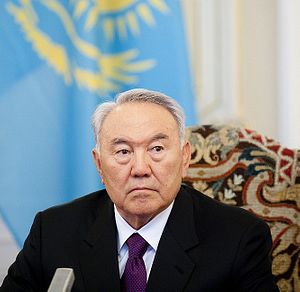The president of Kazakhstan, Nursultan Nazarbayev, gave a speech at the Carnegie Endowment for International Peace in Washington, DC, on Thursday, mostly on his country’s efforts promoting nuclear non-proliferation. Nazarbayev was in Washington for the Nuclear Security Summit, a major initiative of President Barack Obama. The summit, however, was marred by several issues, including Russian non-attendance, violence between Turkish security and protesters, and the fact that Iran was excluded.
Nazarbayev has led Kazakhstan since 1989, when he was the Communist Party’s boss in the Kazakh Soviet Socialist Republic. While acknowledging during his speech that some commentators deemed him autocratic or dictatorial, he also pointed out that under him, Kazakhstan is probably doing the best it has ever been, after 150 years of imperial Russian and Soviet rule, because for once its vast resources are being used in service of its people.
According to Nazarbayev, his country is a leader in global non-nuclear proliferation efforts both because of its choice to give up nuclear weapons inherited from the Soviet Union after independence and because of its role in supplying processed uranium to other countries so that they do not have to set up their own fuel cycles. Kazakhstan, the world’s largest producer of uranium, also sees uranium mining and processing as part of its economic development strategy, with Nazarbayev noting that the country would soon have a full fuel-cycle in place (the fuel-cycle was disrupted by the fall of the Soviet Union). Kazakhstan has recently completed the conversion of the “VVR-K research reactor at the Institute of Nuclear Physics (INP) to low enriched uranium (LEU) fuel,” and returned highly enriched uranium to Russia.
Nazarbayev spoke with particular pride on his nuclear-related actions after becoming Kazakhstan’s leader, noting that his country’s actions gave it a moral right to advocate for non-proliferation. One of his first acts was shutting down the Semipalatinsk Test Site in northern Kazakhstan on August 29, 1991 (four months before its formal independence). Semipalatinsk Test Site was the Soviet Union’s primary nuclear testing grounds, and tests were conducted there without regard for the local population. A tenth of Kazakhstan’s people suffer from illnesses related to nuclear tests done there; Nazarbayev accused the tests of poisoning his people.
Nazarbayev, to his credit, also took the courageous step of giving up his country’s stock of nuclear weapons, inherited from the USSR, which was the world’s fourth largest arsenal at the time. The last nuclear weapons left Kazakhstan for Russia in 1995. Judging by his frequent mention of this fact, this is something that Nazarbayev takes enormous pride in. Additionally, he mentioned other aspects of his non-proliferation efforts, which bore fruit in 2006, of establishing a nuclear weapons free zone in Central Asia, and his country’s role in storing nuclear fuel from Iran.
Nazarbayev also touched on some other issues, including recent elections in his country, Kazakhstan’s place in the Eurasian Economic Union (EEU), and the enormous strides his country has made since independence from the Soviet Union 25 years ago. He emphasized that despite criticisms of his rule, he has consistently been returned to power with a popular mandate every five years, and if people didn’t want him as president, he would be out after elections. He noted that the GDP per capita in his country jumped several times since independence to about $13,000 today because of his economic policies which proved the benefits of his leadership. Finally, he emphasized in very strong terms that the EEU was an economic, and economic organization alone, made up of sovereign states, and was not in any way an attempt to recreate the Soviet Union.
Nazarbayev was very optimistic about his country’s future, noting that its location and resources made it a natural place for investors and trade from and between Russia, China, Europe, the United States, Turkey, Iran, and India. Certainly, while things are not perfect in Kazakhstan–it displays some of the same post-Soviet governance issues that other former Soviet states display–it is on the whole, doing pretty well for itself and certainly much better than its other Central Asian neighbors.

































